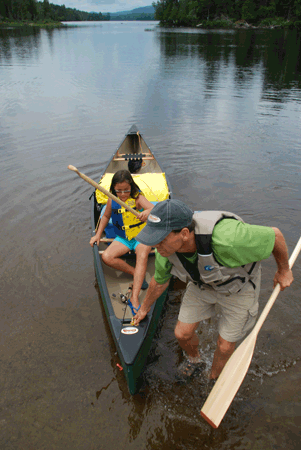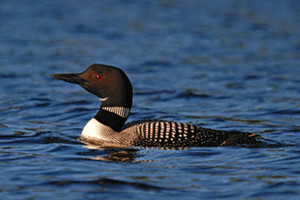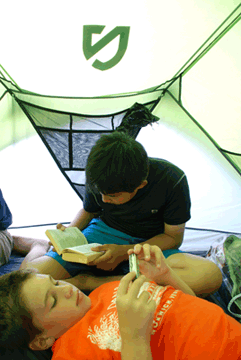(c) Jack Ballard
It’s the dream of many an American, from freckled grade-school girls with missing front teeth to smartly-attired executives who prowl Manhattan’s financial district in search of a deal like pickerel on a perch. Ah, to traipse the shoreline of one’s own, private island. For multiple millions, you just might swing the purchase of this piece of paradise in the Caribbean. In the Adirondacks, you can have one for less than a hundred bucks. At least for a night or two.

Four crafts loaded, prows pointed into a blustery wind pushing knee-high waves into the boat launch at Forked Lake, a crew of six sailors, er, paddlers, prepare to fulfill a fancy. Less than a mile away lies a private island we’ll call home for the next three nights, a shady islet we’ll share with nary another human. For now, the trick is getting there.
Lisa, my sweetheart, and her son, Parker, lead the flotilla in a pair of kayaks. My two sons, Micah and Dominic, paddle an aluminum canoe we rented at the lake, piled high in its center with a mound of gear in dry bags and firewood. Zoe, my nine year-old daughter sits in the front of my 17-foot Old Town Penobscot, a craft whose stability and efficient profile I’ll surely need on this trek. For it’s the youngest member of the crew and I who ferry the lion’s share of the gear to the island in the face of a pernicious wind.
Shortly after we shove from shore, Parker runs aground on a boulder disguised beneath the waves. The overbearing breeze sends waves splashing over the hull of her kayak and nearly into Lisa’s lap. True to brotherly form, Micah and Dominic squabble about who’s to blame for their canoe not running a straight course toward the island. But I’m in no position to manage the mishaps of others. It takes nearly all my strength and stamina to keep the canoe cutting into the waves.
A particularly boisterous swell breaks against the bow, sending spray into Zoe’s face. She laughs and turns to show me her splattered glasses.
“Hey dad, isn’t this fun?”
At least one person thinks so.
In what seems far more than an hour but is more probably around thirty minutes, we reach the leeward side of an island that looks like the back of some humongous sea creature protruding from the lake. But this monster is formed of stone and thin, sandy soil, prickled with stately evergreens and a few deciduous trees whose roots burrow into cracks in the rock for strength and sustenance, whose towering trunks thrust upward toward the infinite sky overhead. Our abode lies just beyond it on a smaller isle with a singular campsite. Rounding the point of the bigger island we’re again buffeted by the waves but only momentarily. Two dozen strokes of my paddle brings us blissfully into calmer water on the sheltered side of our island. We pull the kayaks ashore and moor the canoes to the dock. Lisa is anxious to unload, pitch the tents and arrange a camp. I’m more interested in a rest for my aching shoulders.
Watching the three boys set up the kids’ tent and organize their sleeping quarters in one of its two rooms (Zoe gets the other suite to herself), I’m grateful to share their company, boundless energy and growing competence with outdoor skills. After dinner we dip into the store of firewood that burdened the boys’ canoe. As they roast marshmallows in the dancing flames, I remember an adage from my boyhood on a Montana ranch. “He who cuts his own wood is twice warmed.” Carry much wood in a canoe and it applies as aptly to paddling as cutting.
Just before sunrise, in the first, bashful light of the new day, I awaken to the wavering call of a loon somewhere down the lake. At 1,248 acres, Forked Lake isn’t one of the larger lakes in the Adirondacks, but it certainly claims its share of the wildlife. Loons and ducks are common neighbors to campers, along with ospreys and a host of other birds. Rousing ourselves from the tent, knowing the kids will be unconscious for another two hours, Lisa and I decide to go on a loon hunt. I’ll paddle the canoe and help her spot the game. She’ll shoot the birds from the front seat — with her camera.

Cruising back toward the boat launch, we discover a single bird who allows us to approach within easy photo range. Lisa composes a few nice images, but the water is just rough enough to rock the canoe, making it hard for her to stabilize her long telephoto lens. Looping back toward our island, we spy another loon in a sheltered bay. It, too, seems quite tolerant of our approach. Peering through her camera, Lisa focuses on the beautiful bird, its red orb of an eye intently scrutinizing our now-motionless craft.
“Look!” she exclaims. “There are two chicks on its back.”
Sure enough, two fuzzy youngsters are huddled happily on their mother’s back, seemingly enjoying the first warm rays of sunlight as much as the two humans observing them. Then one decides it’s time for a swim. It plops from mom’s feathered ribcage into the water, immediately followed by its sibling. Within minutes, Lisa has dozens of lovely photos.
Arriving back at camp, we find the kids stirring. Camping on Forked Lake is a delightful exercise in doing without the conveniences of modern life to encounter a world that is big, wild and more soothing to the soul than the lulling whispers of a hypnotist. Breakfast is simple fare: oatmeal with dried blueberries, milk and yogurt. Afterwards, the kids disperse to throw rocks into the water, fish and explore every nook and cranny of the island. At lunch, we’re greeted by a mother mallard and her ducklings, bold little waterfowl who surge forward in frantic competition for any crumb that drops from the half-dozen peanut butter and jelly sandwiches being consumed by a brood of hungry humans. Afterwards, Zoe and the boys coax the adults into the water for a swim from our island to the larger one, an activity that morphs into a daily routine.
In a 1955 article for Sports Illustrated, author George Tichenor penned words which remarkably capture our experience on Forked Lake, 55 years later. “Forked Lake’s greatest charm lies in its wilderness look,” he wrote. “It is an area of great old trees and cool vistas…The ground is springy to the step, the air laced with the fragrance of spruce. Camp life quickly becomes orderly and easy…Hurry back to work? Not on your life!”

For the next two days, there is no work, save the modest chores of dishwashing and food preparation. We do find time for exercise, though, mainly in the form of swimming and evening paddling excursions to explore ever-greater portions of our surroundings. Forked Lake offers fine fishing for smallmouth and largemouth bass, along with smaller, spiny pumpkinseeds, fish Zoe quickly likens to the bluegills she loves to catch at home. On our last evening, Micah and I paddle away from the dock, determined to make a fine showing of our final opportunity to fish for bass. We catch a couple modestly-sized smallmouths. Intent on stretching as much distance as possible from my fly cast, I hear a shriek from the island. Standing on the large, rounded rock jutting into the lake near the picnic table, Zoe is cranking on her spinning reel and yelling.
“I got one, I got one.”
Ceasing our own fishing to enjoy the show, expecting to see yet another pumpkinseed yanked from the water, our mouths drop in amazement when she grapples the largest bass of the trip from its underwater lair.
Paddling back toward the boat launch on the final morning of our adventure in island living, it seems everyone is a little happier, a little stronger and more confident for the experience. Owning a tropical island might make one feel like royalty, but it’s hard to believe it tops being the sovereign, if only for days, of an isle on Forked Lake.
********************************************************************************
Time for a Change?
On two occasions, the pleasure and safety of our evening paddles was marred by individuals on jet-skis and a boat towing a water-skier who roared by hand-powered crafts with reckless abandon. For solitude seekers, one of the greatest attractions of this lake is its lack of the amenities that draw folks who favor motorized forms of recreation. Most adventurers take to the water in a craft that is as Adirondack as the maple tree, the canoe. There are many places to enjoy jet-skis and powerboats in the Forked Lake area. Given the number of hand-powered crafts on Forked Lake, it seems reasonable (in this visitor’s opinion) to limit the horsepower and speed of motorized crafts or eliminate them altogether. Doing so would inconvenience only a very small percentage of recreationists and greatly enhance the safety of others.
